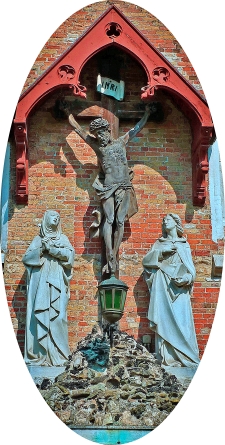But Moses protested to God, “Who am I to appear before Pharaoh? Who am I to lead the people of Israel out of Egypt?… What if they won’t believe me or listen to me?… I’m not very good with words. I never have been, and I’m not now, even though you have spoken to me. I get tongue-tied, and my words get tangled….Lord, please! Send anyone else.” [Exodus 3:11,4:1,10,11 (NLT)]
 When I learned about people like Abraham, David, Moses, and Samson as a girl, they were the Bible’s version of super-heroes like Batman or Superman. The Bible’s heroes were larger than life, obedient, invincible, and seemed to overcome their obstacles effortlessly. Appearing perfect in their faith and actions, they weren’t people to whom I could relate. In reality, they were as flawed as the rest of us but, for the most part, their imperfections and failures were redacted from the stories we learned in Sunday school.
When I learned about people like Abraham, David, Moses, and Samson as a girl, they were the Bible’s version of super-heroes like Batman or Superman. The Bible’s heroes were larger than life, obedient, invincible, and seemed to overcome their obstacles effortlessly. Appearing perfect in their faith and actions, they weren’t people to whom I could relate. In reality, they were as flawed as the rest of us but, for the most part, their imperfections and failures were redacted from the stories we learned in Sunday school.
As a child, I learned that David killed Goliath, was a great warrior, and wrote psalms but I didn’t learn about the 70,000 Israelites who died because he took a census or his sins of rape, adultery, and murder. When I colored pictures of Samson destroying Dagon’s temple, I didn’t know about the disobedience, lust, and pride that got him in such trouble! Although I learned that King Solomon was wise and wealthy, I didn’t know he disobeyed his father, broke God’s law, and over-worked and over-taxed his people.
Truth be told, the Bible’s heroes and heroines were as fallible, insecure, and willful as you and me. The apprehensive Moses listed all his shortcomings while arguing with God and the faint-hearted Gideon tested Him! Barren Hannah struggled with her sense of worth and Naomi grew bitter in widowhood. Moses let his anger get the best of him and Elijah prayed for death in the depth of despair. Abraham was a coward who, to save his skin, gave his wife to another man twice! Timothy’s youth made him timid and insecure and even John the Baptizer had doubts!
The families of our Biblical heroes were as dysfunctional as ours. There were bad marriages—Abigail was married to a brute and Gomer wasn’t faithful to Hosea. There was bad parenting—Eli and Samuel turned a blind eye to their sons’ sins, David failed to discipline his boys Amnon and Adonijah, and Abraham, Isaac, and Jacob played favorites with their sons. There was sibling rivalry—Miriam and Aaron grew jealous of Moses, Jacob stole Esau’s birthright and blessing, Joseph’s brothers sold him into slavery, Leah and Rachael competed for Jacob’s attention, and Martha and Mary had issues! There even was fratricide—Absalom murdered Amnon, Solomon had Adonijah killed, and both Jehoram and Abimelech executed their brothers! Their tangled stories rival the drama of “reality television.”
Indeed, there’s enough sex and violence in the Bible that children only learn the G versions of its stories in Sunday school. We, however, are not children and we need to look at the heroes and heroines of the Bible with the eyes of an adult. My purpose is not to throw mud on the Bible’s heroes and heroines—it’s to make them relatable.
Rather than super heroes, God used people as flawed and imperfect as we are and from families as screwed up as ours. Like us, they struggled with challenges, pain, infertility, temptation, impatience, anger, jealousy, depression, and even their faith. They faced real challenges, made mistakes, sinned more than once, questioned God, and even failed at times. If God could use such flawed people to accomplish His purpose, think of what He can do with you and me!
There will be no “knights in shining armor” in God’s kingdom; our armor will have many dings and dents. No, no perfect Hollywood heroes will ride to save the day; just wearied saints to look to God and, in weakness, find Christ’s strength. This, indeed, is the essence of God’s kingdom: divine greatness manifest in common people. [Francis Frangipane]

 Having quoted from Isaiah when proclaiming the Messiah’s arrival, we know John knew Isaiah’s prophecies. The Messiah would “bind up the brokenhearted [and] proclaim liberty to captives and freedom to prisoners,” [61:1] but, after spending more than a year confined to a dark cell, John had neither liberty nor freedom. It’s no wonder he doubted.
Having quoted from Isaiah when proclaiming the Messiah’s arrival, we know John knew Isaiah’s prophecies. The Messiah would “bind up the brokenhearted [and] proclaim liberty to captives and freedom to prisoners,” [61:1] but, after spending more than a year confined to a dark cell, John had neither liberty nor freedom. It’s no wonder he doubted. Most of us probably spent Saturday preparing for Easter. We may have done last minute grocery shopping, prepped for Easter dinner, purchased an Easter lily, decorated eggs, assembled Easter baskets, snacked on jelly beans, or hidden plastic eggs around the yard. The previous day’s service on Good Friday had been a somber one but we knew the following day’s worship would be one of joy and celebration. While we may have sung “Were you There When They Crucified My Lord?” on Friday, we knew that we’d be singing “Christ the Lord is Risen Today” on Sunday.
Most of us probably spent Saturday preparing for Easter. We may have done last minute grocery shopping, prepped for Easter dinner, purchased an Easter lily, decorated eggs, assembled Easter baskets, snacked on jelly beans, or hidden plastic eggs around the yard. The previous day’s service on Good Friday had been a somber one but we knew the following day’s worship would be one of joy and celebration. While we may have sung “Were you There When They Crucified My Lord?” on Friday, we knew that we’d be singing “Christ the Lord is Risen Today” on Sunday.
 I read a devotion that suggested substituting our own personal anxieties and concerns for the troubles listed by Paul in Romans 8. Perhaps your version would read: “And I am convinced that nothing can ever separate me from God’s love. Neither old age nor loss of loved ones, neither cancer nor dementia, neither my anxiety about my wayward child nor my reservations about finances—not even the powers of terrorism and hate can separate me from God’s love. No hurricanes, earthquakes, pandemics, or wars—indeed, nothing in all creation will ever be able to separate me from the love of God that is revealed in Christ Jesus our Lord.”
I read a devotion that suggested substituting our own personal anxieties and concerns for the troubles listed by Paul in Romans 8. Perhaps your version would read: “And I am convinced that nothing can ever separate me from God’s love. Neither old age nor loss of loved ones, neither cancer nor dementia, neither my anxiety about my wayward child nor my reservations about finances—not even the powers of terrorism and hate can separate me from God’s love. No hurricanes, earthquakes, pandemics, or wars—indeed, nothing in all creation will ever be able to separate me from the love of God that is revealed in Christ Jesus our Lord.” “He’d always looked at religion as a crutch for people who were too scared to do life by themselves,” is the way author Chris Fabry described a character in his book June Bug. That description made me think of Karl Marx’s frequently paraphrased statement: “Religion is the opium of the people.” Sigmund Freud had an equally low opinion of religion and described it as a form of wish fulfillment. Thinking of religion as little more than a man-made coping mechanism for dealing with the harsh realities of life, Fabray’s character, Marx, and Freud disparaged it along with things like crutches and pain relievers.
“He’d always looked at religion as a crutch for people who were too scared to do life by themselves,” is the way author Chris Fabry described a character in his book June Bug. That description made me think of Karl Marx’s frequently paraphrased statement: “Religion is the opium of the people.” Sigmund Freud had an equally low opinion of religion and described it as a form of wish fulfillment. Thinking of religion as little more than a man-made coping mechanism for dealing with the harsh realities of life, Fabray’s character, Marx, and Freud disparaged it along with things like crutches and pain relievers.